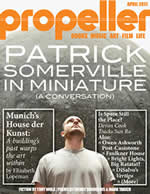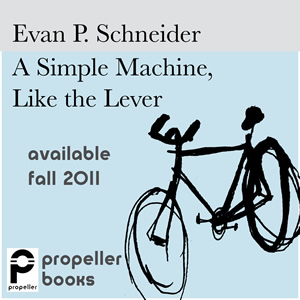 Propeller No. 7, Spring 2011
Propeller No. 7, Spring 2011
Patrick Somerville on the conventions of literary fiction; Elizabeth Lopeman on Islamic art in Munich's House der Kunst; Devan Cook on Sun Ra; Lee Ware on New Orleans' Faulkner House Books; Mary Rechner on Louise DeSalvo's Vertigo; fiction from Tony Wolk; poems from Mark Yakich and Wendy Bourgeois; conclusions from Owen Ashworth; pairs from Evan P. Schneider and Rose Gebken.
Patrick Somerville Expands the Universe
a craft Q&A
“Sometimes new truths, new emotional states, new weird beauties and new ideas that may actually bring solace or new life to people can only be found far, far down the path of false premises.” Patrick Somerville discusses some of the motivation behind the stories in his new collection, The Universe in Miniature in Miniature.
Within the Walls of House der Kunst
by Elizabeth Lopeman
“In spite of movements to shift the purposes of the museum’s chilly corridors and austere marble halls, the intensity of the Nazi agenda to support nothing but classical art has been too well reflected and realized in the architecture of the building.” Elizabeth Lopeman on the shifted meanings of Islamic art or the work of Ai Weiwei when in Munich's House der Kunst.
Is Space Still the Place? Tracking Sun Ra
by Devan Cook
“Sunshine...it doesn’t produce the sun. The wind, it doesn’t produce the wind. All planet Earth produces is the dead bodies of humanity. That’s its only creation.” --Sun Ra. Devan Cook considers the jazz master's mythology, his music, and contemporary inheritors.
Shop: Faulkner House Books
by Lee Ware
“Under the guidance of Sherwood Anderson, Faulkner wrote his first novel, Soldiers’ Pay, while living on the ground floor. His principal room is now the main room of the bookstore.” Lee Ware takes us on a tour of Faulkner House Books in New Orleans.
Pair: Bright Lights, Big City and Ratatat's Classics
by Evan P. Schneider
"Few albums pair better with the experience of being dropped into the speeding heart of someone’s weeklong coke binge and yearlong downward spiral than Ratatat’s Classics." Evan P. Schneider pairs McInerney's Bright Lights, Big City with the music of Ratatat.
Review: Vertigo by Louise DeSalvo
reviewed by Mary Rechner
"Although the women say they miss their men (and try to teach their children to miss them, as well), and although they spend hours of every day penning long accounts of their brave and unhappy lives alone to their husbands in combat, their lives, and those of their children, are far happier than either before their husbands go to war or after their husbands return home.” --Louise DeSalvo, in Vertigo, her memoir of her WWII-era childhood. Mary Rechner discusses the book and how it has been passed through her family
Fiction: "Due Cigni Negri, Two Black Swans"
by Tony Wolk
"She loved them both, each for his own person. She loved the one who led the way and the one who followed. Time she spent with one and then the other. One, when she was with the other, would watch, like a dog with his eyes on a pair of swans by the river’s edge."
Three Poems
by Wendy Bourgeois
"In the archives, the one weeps
over old footage of Freddie Mercury,
the other, a bit of lace wrapped
around a tea spoon and
I swear to you those pink lights
winking in another room are just that,
ephemeral doodads from a novelty store."
-- from "Dear Beloved Other"
Pair: Jean Follain and Coq au Vin
by Rose Gebken
"Though Follain doesn’t name the sauce on the platter in his poem, I know it is coq au vin, both because of its appearance and because of the transformative power it exerts over its surroundings." Gebken pairs Follain's "A World Rich With Anniversaries" with the French dish.
Fear of Poety
by Mark Yakich
"Today, I am a poet. But as a child I found Dr. Seuss’s books irritating, and I only checked books out of the library because I liked how they decorated my nightstand. In grade and middle school, the only thing I remember reading or writing were love letters, carefully folded in triangles like the flags of third-world countries I couldn’t name." Mark Yakich writes about poetry, and offers a poem of his own.
Music: Owen Ashworth
a correspondence
"They both took free classes at the Harvard Extension School’s Heaven campus and wrote a humorous essay about their terrestrial chauffer pact." Owen Ashworth (former frontman of Casiotone for the Painfully Alone) helps conclude some fables we start.
Fiction: "I Senzanome, The Nameless Ones"
by Tony Wolk
"You ask, Did Patience know of her beauty? I can answer that question: No, she did not. The word Beauty, as with many other words, had fallen by the wayside. Think of the word Beauty as turned to dust. And without a word to anchor you, unless you are a beast of the earth or a bird of the air, you will see, but you will not see Beauty."




